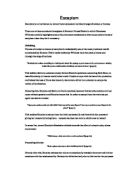We shouldnt be shocked by Stanleys attitude to women and his violent behaviour; he is just a product of his time. In the light of this statement, explore how Williams presents masculinity in A Streetcar Named Desire.
A STREETCAR NAMED DESIRE EXAM PRACTICE
‘We shouldn’t be shocked by Stanley’s attitude to women and his violent behaviour; he is just a product of his time.’ In the light of this statement, explore how Williams presents masculinity in A Streetcar Named Desire.
(Total for Question 17 = 20 marks)
The question of whether the reader of A Streetcar Named Desireshould conceive every aspect of behavior exhibited by the key characters as being symbolic of their time is one that has been dogged by controversy. According to some readers, Stanley’s attitude to women and his violent behavior is nothing but a representation of the male values of the 20th Century South American society. However, some readers still argue that Stanley is just an individual, and like any one of us, his actions should be perceived as products of his personal beliefs, values and choices. Simply stated, the answer to this question totally depends on the school of thought from which the reader operates.
The proponents of the view that Stanley’s attitude to women and his violent behavior is a mere representation of his time argue that the way of life in the 20th Century South American society in which the play is set made it necessary for low-class members of society to use brute force in order to get their voices across. Such readers would cite the fact that the way of life in the South created two classes of people, the bourgeoisie and the proletariat, who were in constant conflict with each other over resources. Being a very poor man himself, Stanley naturally fitted into the proletariat class (a group of serfs who had lived under oppression by the Lords of the South for generations until the revolution). Thus, when we hear from Stella how Stanley “snatched off one of [her] slippers” on their wedding night and “rushed about the place smashing the light bulbs with it”, we cannot help feeling that pent-up emotions could have been responsible for Stanley’s violent behavior.








